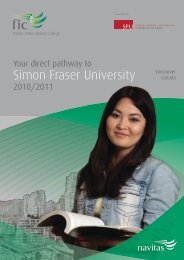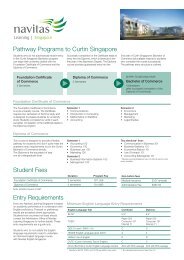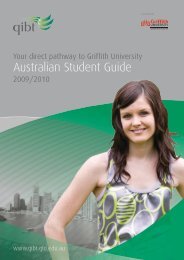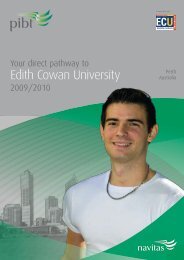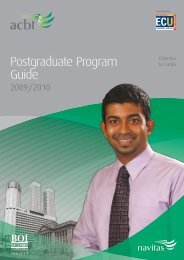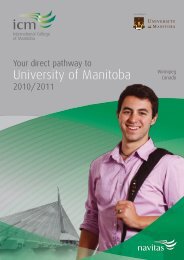Undergraduate Program Guide - Navitas
Undergraduate Program Guide - Navitas
Undergraduate Program Guide - Navitas
Create successful ePaper yourself
Turn your PDF publications into a flip-book with our unique Google optimized e-Paper software.
University Foundation <strong>Program</strong><br />
Unit content<br />
• BIO001 Biology<br />
This unit focuses on both the understanding and<br />
investigation of general biological concepts associated with<br />
the structure, function, reproduction, evolution, distribution<br />
and interactions of living organisms, in addition to basic<br />
techniques used in genetic engineering and biotechnology.<br />
• BUS100 Accounting 1<br />
This unit introduces students to the basic procedures and<br />
principles of accounting. Topics covered include accounting<br />
concepts, journals,<br />
ledger accounts, trial balance and cash control.<br />
• BUS102 Communication 1<br />
This unit focuses on the development of skills necessary<br />
to be able to communicate effectively in both the spoken<br />
and written form. Topics covered include the development<br />
of grammatical, listening and note-taking skills, verbal<br />
and non-verbal communication, written communication<br />
including reports, and making presentations.<br />
• BUS102D Study and learning skills<br />
This unit teaches students the necessary academic skills<br />
for university studies. Topics include academic writing skills,<br />
research skills, presentation skills, APA referencing, using<br />
the Internet for research purposes.<br />
• BUS103 Economics<br />
This unit introduces students to key economic issues.<br />
Students will gain an understanding of the economic<br />
framework and cover the topics of Australian market<br />
reforms, demand and supply, wages and wage fixation.<br />
• BUS105 Statistics<br />
This unit introduces students to basic statistical techniques.<br />
Students will learn the interpretation and analysis of<br />
numerical data and cover other areas such as univariate and<br />
bivariate data analysis, probability techniques, law of chance<br />
and graphical representation of data.<br />
• BUS107 Introduction to Computing<br />
This unit introduces students to the fundamental computer<br />
concepts. Students learn a wide variety of software<br />
packages, eg, Word, Excel, Access as well as computer<br />
theory. Students also gain the necessary skills for effective<br />
use of the Internet.<br />
• BUS108 Management<br />
This unit provides students with a basic understanding of<br />
management. The role of a manager in organizations will be<br />
studied and students will also be introduced to the concept<br />
of organizational behavior.<br />
• BUS109 Marketing<br />
This unit introduces students to the basic principles<br />
of marketing. Students will learn how to identify<br />
target markets and develop market strategies. Market<br />
segmentation and the interrelationship of marketing and<br />
selling will also be studied.<br />
• CHE001 Chemistry<br />
This unit introduces students to the fundamental concepts,<br />
principles and theories of chemistry both organic and<br />
inorganic. Focus is on macroscopic properties of matter,<br />
atomic structuring/bonding, and an introduction to<br />
chemical reactions.<br />
• COM101 <strong>Program</strong>ming<br />
This unit provides a basic introduction to C <strong>Program</strong>ming.<br />
• MTH001 Advanced Mathematics 1<br />
The main objective of this unit is to improve problem<br />
solving skills of students by introducing them to four<br />
basic mathematics modules: Algebra, Trigonometry,<br />
Calculus, and Matrices.<br />
• MTH002 Advanced Mathematics 2<br />
This builds on the work covered in Advanced Mathematics<br />
1 with a major focus on Calculus. Topics include the<br />
application of differential calculus, small changes,<br />
application to economics, displacement, velocity,<br />
acceleration and optimization, volume of revolution, area<br />
between curves, indefinite and definite integrals, matrices<br />
– operations, inverse matrices and vectors are all covered.<br />
• PHY013 Physics<br />
Physics 1 is an introductory unit which introduces students<br />
to the basic principles of Physics. Mechanics, heat energy<br />
and fluid motion are the main areas of study.<br />
• PHY014 Physics 2<br />
Physics 2 builds on the work covered in Physics 1 and<br />
introduces students to the following topics – basic<br />
electricity, electric fields, capacitors (charging and<br />
discharging), waves and sound, wave optics, interference<br />
of waves, polarization, radio activity, hot electricity,<br />
analogue and digital electronics, X- rays, and cathode<br />
ray oscilloscope.<br />
9



